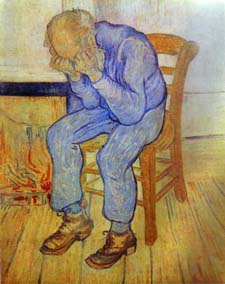The Person in the Mirror
Pointing out the faults of others seems to a human trait of which I must plead guilty. If you are like me, blaming others for your shortcomings is a very destructive habit of which God is not pleased. God has asked us not to point out the sins of others, but to admit our own sinfulness in all honesty.
Jesus taught us the parable of the Publican and the Pharisee to explain the difference between pride and humility. "Two men went up into the temple to pray, one a Pharisee and the other a tax collector. The Pharisee stood and prayed thus with himself, `God, I thank You that I am not like other men, extortionists, unjust, adulterers, or even like this tax collector. I fast twice a week, I give tithes of all that I get.' But the tax collector, standing far off, would not even lift up his eyes to heaven, but beat his breast, saying, `God, be merciful to me a sinner!' (Luke 18:11-13)
The Pharisee raddled off a list of all the things that he “did for God” thinking that these acts would make him righteous in the sight of God. Yet, he failed to exhibit remorse for sin. He choose to exalt himself in contrast to “sinful” others. The Publican acknowledged his own sins and cried out seven simple words: "God, be merciful to me a sinner." The humility of the Publican became his salvation.
 Like the Publican, our life should be one of introspection. It means to look at yourself, your motivations and habits, your strengths and weaknesses, your successes and failures, your dreams and the circumstances of everyday life and how you include God in your decision making. It means to conform to God’s will and not our own. Introspection asks us, how do we love others? Do we bring healing to those around us? Do we chase others away because they didn't do it our way, or do we have a "I'm right and they are wrong” attitude? Do we treat others they we we wish to be treated? Do we minister to others who were different from us regardless of creed, social status or race or only to those who agree with us? Are we quick to forgive others? Do you love yourself as a child of God? Before we retire for the evening, introspection asks us “Did I give to God my best today?”
Like the Publican, our life should be one of introspection. It means to look at yourself, your motivations and habits, your strengths and weaknesses, your successes and failures, your dreams and the circumstances of everyday life and how you include God in your decision making. It means to conform to God’s will and not our own. Introspection asks us, how do we love others? Do we bring healing to those around us? Do we chase others away because they didn't do it our way, or do we have a "I'm right and they are wrong” attitude? Do we treat others they we we wish to be treated? Do we minister to others who were different from us regardless of creed, social status or race or only to those who agree with us? Are we quick to forgive others? Do you love yourself as a child of God? Before we retire for the evening, introspection asks us “Did I give to God my best today?”
Frequently, Christ took time to be alone with the Father. The Bible recalls the time when Jesus “had dismissed the crowds, He went up on the mountain by Himself to pray. When evening came, He was there alone” (Matthew 14:23). If Christ took time to talk to the Father, we also should spend quality time each day to be alone with Him. Like a child with its parent, we need to sit in the presence of our heavenly Father to talk about “how things are going” in our relationship with Him. The conversation may be very tough and frank, it may be short or long, there may be laughter or even the shedding of tears. God's love is so strong that He desires to be in intimate communion with us.
What are the issues that have caused a strained relationship with our heavenly Father? The short answer is sin. It is the same reason why Churches and congregations are divided, families and friendships are often broken apart and spouses become estranged. Sin has many ugly facets and is “couching at the door; its desire is for you, but you must master it” (Genesis 4:7).
 True introspection keeps us grounded in reality about ourselves and our surroundings. It provides us with the necessary resolve to get up again when we miss the mark. It raises us from our sin and washes us with tears of repentance. As mortals and sinners we need God's grace and mercy and must live in a way that reflects this truth. Without self-examination, there is no progress in the spiritual life.
True introspection keeps us grounded in reality about ourselves and our surroundings. It provides us with the necessary resolve to get up again when we miss the mark. It raises us from our sin and washes us with tears of repentance. As mortals and sinners we need God's grace and mercy and must live in a way that reflects this truth. Without self-examination, there is no progress in the spiritual life.
After you have searched your soul and left no stone unturned, acknowledgement and confession of sin is the next step. Many spiritual writers have compiled an “examination of conscience” to prepare yourself for sacramental confession. These lists are very valuable aids designed to move the penitent from sorrow for sin into liberation, hope, inner peace and resolution. Just as we are told to "hate the sin and love the sinner," don't focus on the sins that you have confessed for too long, otherwise this will lead you into despair. Once a sin is confessed and absolution is pronounced, don't mentally dig up the dead carcus. Just like at a funeral, the grave of the loved one is sealed by the priest "until the second Coming of Christ," do not open your casket which contains your past sins that has been sealed with the sign of the Cross. Only at Christ's Second and Glorious Coming will the "books be opened and all hidden things revealed" (Kondak of Meat-Fare Sunday).
You do not know how much time is remaining in your earthly life. Time is short; your soul may be required of you this night. (Luke 12:20) Do not hide any sin from Him just as Adam did in the Garden of Eden because in reality, He knows it already. The Rite of Confession of the Eastern-Byzantine Church states that if you conceal any transgression “you will have the greater sin.” Unconfessed sin leads to a life of misery and will make itself manifest eventually someday in ways that will hurt you and those whom you love. The Prophet King David even mentions that sin left unconfessed can negatively effect your physical health: "When I did not declare my sin, my body wasted away" (Psalm 32:3). God only asks that you come to Him in brokenness, give your faults to Him and have a firm intention not to sin again. If you should later stumble again, God is pleased with you getting up, dusting yourself off and starting all over.
Asking God for help or seeking the advise of a spiritual mentor is not a sign of weakness. It is an admission that you cannot rely on your own strength. The Bible says that, “all the ways of a man are pure in his own eyes, but the Lord weighs the spirit” (Proverbs 16:2). He, Who is ever-faithful will open the eyes of your heart, so that, with the light of faith you can identify your sin and declare it to Him in a worthy, concise and total way.
Spiritual progress will only happen when you choose to make Christ a part of your everyday life, that includes your ups and downs, successes and drawbacks, disappointments and joys, times of great faith and periods of spiritual famine, fear, doubt and despair. The Psalmist David states: "Even though I walk through the valley of the shadow of death, I fear no evil; for You are with me; Your rod and Your staff, they comfort me” (Psalm 23:4). God has taken care of you and desires your happiness and salvation.
Introspection is a vital step toward renewing your life in Christ. Confess your sins and place them at the foot of the Cross where there is total remission of sins. When you thank Him for your pains, which are really His pains, and your joys, which are really His joys then you will experience the abundant life! So, it's time to look in the mirror and say, "Yes, God is big enough forgive my every sin."
©2005 - Raymond J. Mastroberte
12/30/05
HomePage
Archived Articles
 Like the Publican, our life should be one of introspection. It means to look at yourself, your motivations and habits, your strengths and weaknesses, your successes and failures, your dreams and the circumstances of everyday life and how you include God in your decision making. It means to conform to God’s will and not our own. Introspection asks us, how do we love others? Do we bring healing to those around us? Do we chase others away because they didn't do it our way, or do we have a "I'm right and they are wrong” attitude? Do we treat others they we we wish to be treated? Do we minister to others who were different from us regardless of creed, social status or race or only to those who agree with us? Are we quick to forgive others? Do you love yourself as a child of God? Before we retire for the evening, introspection asks us “Did I give to God my best today?”
Like the Publican, our life should be one of introspection. It means to look at yourself, your motivations and habits, your strengths and weaknesses, your successes and failures, your dreams and the circumstances of everyday life and how you include God in your decision making. It means to conform to God’s will and not our own. Introspection asks us, how do we love others? Do we bring healing to those around us? Do we chase others away because they didn't do it our way, or do we have a "I'm right and they are wrong” attitude? Do we treat others they we we wish to be treated? Do we minister to others who were different from us regardless of creed, social status or race or only to those who agree with us? Are we quick to forgive others? Do you love yourself as a child of God? Before we retire for the evening, introspection asks us “Did I give to God my best today?” True introspection keeps us grounded in reality about ourselves and our surroundings. It provides us with the necessary resolve to get up again when we miss the mark. It raises us from our sin and washes us with tears of repentance. As mortals and sinners we need God's grace and mercy and must live in a way that reflects this truth. Without self-examination, there is no progress in the spiritual life.
True introspection keeps us grounded in reality about ourselves and our surroundings. It provides us with the necessary resolve to get up again when we miss the mark. It raises us from our sin and washes us with tears of repentance. As mortals and sinners we need God's grace and mercy and must live in a way that reflects this truth. Without self-examination, there is no progress in the spiritual life.